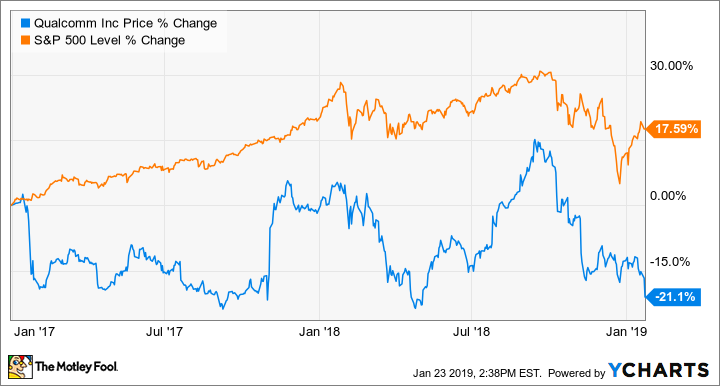Check out the latest Qualcomm earnings call transcript.
Mobile-chip giant Qualcomm (QCOM -0.20%) has had a rough couple of years, in no small part due to legal challenges all around the world. That includes a contentious suit filed by Apple (AAPL 0.52%) two years ago, as well as legal complaints filed by regulators including the U.S. Federal Trade Commission, an antitrust trial that is currently playing out right now in California federal court.
Shares have lagged the broader market by a significant margin over the past two years, but one activist investor thinks there's a lot more downside in store.
Making a short thesis
Kerrisdale Capital, which is short Qualcomm shares, today released a research report arguing that Qualcomm is "teetering on the brink of disaster" and that its unique business model, which includes licensing its technology while simultaneously selling chips, is "living on borrowed time." Kerrisdale points to numerous authorities globally that have accused Qualcomm of monopolistic and anticompetitive behavior, including China, Taiwan, South Korea, and Japan.

Image source: Qualcomm.
The FTC trial is unearthing some damning evidence as well, including an internal 2015 document that acknowledged that licensing its technology on fair, reasonable, and non-discriminatory (FRAND) terms to rivals like Intel could crush its business model. For example, here's an excerpt from the FTC's trial brief (via FOSS Patents):
Qualcomm's internal documents recognize the impact that offering competitors FRAND licenses would have on Qualcomm's ability to secure elevated royalties from OEMs. In 2005, Qualcomm's Marvin Blecker explained that making a license available to a chip competitor would impair Qualcomm's ability to collect high royalties from OEM customers: 'we absolutely cannot give a chip supplier a full license to our IP with pass through rights to his customers as that would have the potential of severely impacting our subscriber licensing program.' [...] Qualcomm's views were unchanged in 2015, when it concluded that granting a FRAND license to Intel 'would destroy the whole current QTL [licensing] business.
Apple has tried to license Qualcomm tech under FRAND terms to no avail. Companies that hold standards-essential patents (SEPs) are required to license that intellectual property on FRAND terms. "And they don't do that," Apple CEO Tim Cook recently said.
The FTC has a strong case
Kerrisdale believes that Qualcomm will ultimately lose the FTC case, which is set to conclude at the end of January. If Judge Lucy Koh sides with the FTC, regulators could force Qualcomm to license its SEPs on FRAND terms. Koh had already issued a preliminary ruling in November saying Qualcomm is required to license its technology. It's worth noting that the FTC is not seeking some monetary penalty like a fine -- regulators want to fundamentally alter Qualcomm's entire business model and allow customers to renegotiate their licensing agreements.
In addition to licensing SEPs on FRAND terms, the FTC largely agrees with Apple that royalty rates should be based as a percentage of the modem sale price, not the retail price for the entire mobile device. For example, Kerrisdale considers a hypothetical scenario where Intel licenses SEPs from Qualcomm at FRAND rates around $1. A rival modem manufacturer could sell a modem chip for $20, then Apple's (or any other smartphone maker) total cost would be around $21 to secure the necessary cellular connectivity. Qualcomm would then be unable to get away with charging $20 in per-device royalties in addition to selling the $20 modem chip.
Remember that earlier this month, Apple COO Jeff Williams testified that Apple initially thought a FRAND rate should be around $1.50 per device, and that it pays $12 to $20 per device in royalties via its contract manufacturers (before factoring in the cost of the modem chip or the rebates that Qualcomm used to give Apple). After rebates, Apple pays about $7.50 per device, and Qualcomm had previously tried to jack that rate up by an additional $8 to $10 per device, which would have more than doubled its royalty burden.
Kerrisdale values Qualcomm shares at just $21
In Kerrisdale's view, if the judge rules in the FTC's favor (emphasis original), "it could realistically cut Qualcomm's licensing revenue, earnings power, and stock price in half." If Qualcomm's licensing business were upended by widespread renegotiations based on FRAND levels, Kerrisdale believes Qualcomm would miss out on $2.7 billion in licensing revenue, relative to the $5.2 billion in licensing revenue it generated in fiscal 2018. Under such a scenario, Kerrisdale values Qualcomm shares at just $21 based on peer multiples, representing 60% downside from current levels.
Even beyond the FTC trial, Qualcomm's business faces other challenges. The smartphone market is maturing, rival modem makers are starting to catch up technologically, and prominent customers are increasingly in-sourcing development of modems. The legal and competitive risks continue to mount, and Kerrisdale concludes, "Soon, investors will have to grapple with the fact that Qualcomm's long-standing business model is likely going the way of its CDMA technology -- a historical relic that lingers on beyond its glory days as a shadow of its former self."






